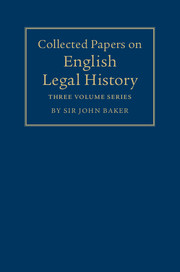Book contents
- Collected Papers on English Legal History: Volume I
- Contents
- List of Illustrations
- Acknowledments
- List of Abbreviations
- Introduction
- PART I The Legal Profession
- PART II The Inns of Court and Chancery
- 7 The Third University of England
- 8 The Inns of Court in 1388
- 9 The Division of the Temple: Inner, Middle and Outer
- 10 The Inn of the Outer Temple
- 11 The Old Constitution of Gray's Inn
- 12 The Ancient and Honourable Society of Gray's Inn
- 13 The Inns of Court and Chancery as Voluntary Associations
- 14 The Judges as Visitors to the Inns of Court
- PART III Legal Education
- PART IV Courts and Jurisdictions
- Collected Papers on English Legal History: Volume II
- Contents
- PART V Legal Literature
- PART VI Legal Antiquities
- PART VII Public Law and Individual Status
- PART VIII Criminal Justice
- Collected Papers on English Legal History: Volume III
- Contents
- PART IX Private Law
- PART X General
- Bibliography of the Published Works of Sir John Baker
- Index
13 - The Inns of Court and Chancery as Voluntary Associations
from PART II - The Inns of Court and Chancery
Published online by Cambridge University Press: 05 December 2014
- Collected Papers on English Legal History: Volume I
- Contents
- List of Illustrations
- Acknowledments
- List of Abbreviations
- Introduction
- PART I The Legal Profession
- PART II The Inns of Court and Chancery
- 7 The Third University of England
- 8 The Inns of Court in 1388
- 9 The Division of the Temple: Inner, Middle and Outer
- 10 The Inn of the Outer Temple
- 11 The Old Constitution of Gray's Inn
- 12 The Ancient and Honourable Society of Gray's Inn
- 13 The Inns of Court and Chancery as Voluntary Associations
- 14 The Judges as Visitors to the Inns of Court
- PART III Legal Education
- PART IV Courts and Jurisdictions
- Collected Papers on English Legal History: Volume II
- Contents
- PART V Legal Literature
- PART VI Legal Antiquities
- PART VII Public Law and Individual Status
- PART VIII Criminal Justice
- Collected Papers on English Legal History: Volume III
- Contents
- PART IX Private Law
- PART X General
- Bibliography of the Published Works of Sir John Baker
- Index
Summary
It seems almost a contradiction in terms nowadays to speak of an unincorporated university, yet some of our best lawyers used to refer to the inns of court and chancery as the ‘Third University of England’. The word ‘university’ in this context was not being used as a legal term of art, but was intended to convey the same sentiment as Fortescue intended when he wrote (in about 1470) that the inns formed a studium publicum more suited to the study of English law than any university. For this lawyers' university or studium was unusual, if not unique, in having virtually no existence as a body. Its constituent colleges were autonomous and formed a university only in the sense that they performed similar functions, in close geographical proximity, under the general supervision of the king's council or the judges. The inns had no recorded foundations or written constitutions, and were never incorporated, either individually or collectively. Most writers on corporate personality have treated them as awkward anomalies, to be mentioned in asides or footnotes as exceptions to the usual course of things. Even the more practical law books treat the legal status of these societies as a matter of speculation. Yet why should lawyers, of all people, have been a law unto themselves? Their inns have played a prominent part in the history of the nation. Can we believe that they were denied privileges granted not only to academics and merchants but even to scriveners and parish clerks?
- Type
- Chapter
- Information
- Collected Papers on English Legal History , pp. 213 - 237Publisher: Cambridge University PressPrint publication year: 2013



